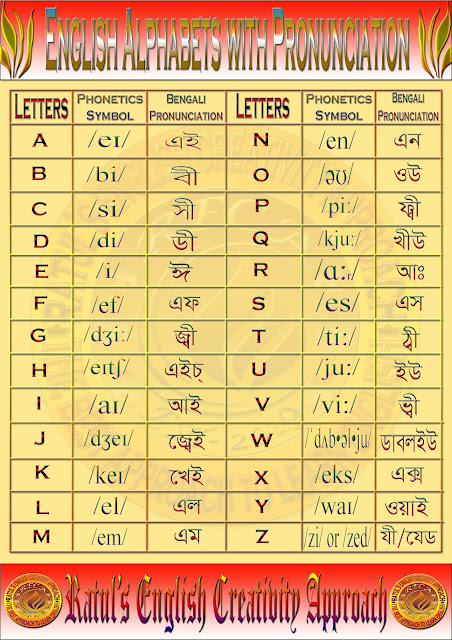Definition: যদি verb এর কোন রুপ বা form এর মাধ্যমে subject এর নিষ্ক্রিয় বা সক্রিয় অবস্থা নির্দেশ করা হয়, তবে তাকে voice বা বাচ্য বলে।
Voice বা বাচ্য সাধারণত দুই প্রকার। যথাঃ
1. Active Voice: যদি কোন voice বা বাচ্য দ্বারা এমন কিছু নির্দেশ করা হয় যে subject নিজে কাজ করেছে কিনা, তবে তাকে active voice বলে। অর্থাৎ এ ধরনের বাক্যে subject কে প্রধান্য দেয়া হয়।
যেমন, Ratul does the work. (এখানে Ratul কাজটি করছে। তাই Ratul হচ্ছে এই বাক্যের Subject)
2. Passive Voice: যদি কোন voice বা বাচ্য দ্বারা এমন কিছু নির্দেশ করা হয় যে subject কে প্রাধান্য না দিয়ে subject এর কাজকে অর্থাৎ object কে প্রাধান্য দেয়া হয়, তবে তাকে passive voice বলে।
যেমন, The work is done by Ratul. (এখানে Ratul এর মাধ্যমে কাজটি সম্পাদিত হলেও Ratul কে প্রাধান্য না দিয়ে Ratul এর কাজকে বা object কে প্রাধান্য দেয়া হয়েছে।)
 |
| Changing Subjective Case into Objective Case in Voice |
Transformation of Active Voice into Passive Voice: Sentence বা বাক্যভেদে Voice Changing এ ভিন্নতা থাকলেও এর একটি Universal Structure আছে। Structure টি হলোঃ
Active Voice: Subject + Verb + Object
Passive Voice: Object + Auxiliary Verb + Verb (Past Participle Form) + by + Subject
 |
| Universal Structure of Changing Voice |
#Rule 02: Continuous Tense: Active Voice to Passive Voice
(a) Present Tense:
Active: Subject + am/is/are + verb (ing) + object
Passive: Object + am/is/are + being + verb (participle form) + by + subject
Example:
Active: Ratul is doing the work.
Passive: The work is being done by Ratul.
Changing Voice of Interrogative Sentences:
এই ধরনের Sentence গুলোও Tense অনুযায়ী করতে হবে। তাই নিম্নে শুধুমাত্র এর Basic Structure বা মৌলিক গঠন দেয়া হলো।
#Rule 01: Auxiliaries (Active Voice to Passive Voice)
Active: Auxiliary verb + subject + main verb + object + complement (যদি থাকে) + interrogation Mark (?)
Passive: Auxiliary verb + object + main verb (participle form) + by + subject + complement (যদি থাকে) + interrogation Mark (?)
Example:
Active: Is Ratul doing the work?
Passive: Is the work being done by Ratul?
#Rule 02: W/h Words (Active Voice to Passive Voice)
Active: W/h words + auxiliary verb + subject + main verb + object + complement (যদি থাকে) + interrogation Mark (?)
Passive: W/h words + auxiliary verb + object + main verb (participle form) + by + subject + complement (যদি থাকে) + interrogation Mark (?)
Example:
Active: What is Ratul doing since morning?
Passive: What is being done by Ratul since morning?
[এখানে W/h words বলতে বুঝায় Who, When, Where, What, Which, How etc.]
বিশেষ দ্রষ্টব্য ০১ঃ যদি বাক্যে Who থাকে তবে by Whom লিখতে হবে। আর যদি whom থাকে তবে who লিখতে হবে।
বিশেষ দ্রষ্টব্য ০২ঃ যদি বাক্যটি negative হয়, তবে passive voice করার সময় auxiliary verb এর পর শুধু not দিতে হবে।
Changing Voice of Imperative Sentence:
এই ধরনের বাক্য দ্বারা order (আদেশ), request (অনুরোধ), forbid (নিষেধ), advice (উপদেশ) বোঝানো হয়। আর এই ধরনের বাক্যগুলো সাধারণত verb দ্বারা শুরু হয়।
#Rule 01: Structure of passive voice: order, request, forbid, advice
Affirmative: Let + object + be + verb(participle form) + by you.
Example:
Active: Do the work right now.
Passive: Let the work be done by you right now.
Negative: Let not + object + be + verb(participle form) + by you.
Example:
Active: Do not waste waste the time especially at the time of your examination.
Passive: Let not the time be wasted by you especially at the time of your examination.
[বিশেষ দ্রষ্টব্যঃ Let's বা Let us থাকলে passive voice করার সময় by you না হয়ে by us হবে।]
Example:
Active: Let's play the football.
Passive: Let the football be played by us .
Changing Voice of Modal Auxiliaries:
Modal auxiliaries গুলো হচ্ছে can, could, may, might, shall, should, will, would, must, ought to, have to, has to, had to, am to, is to, was to, were to, need to, are to etc.
#Rule 01: Structure (Active Voice to Passive Voice)
Active: subject + modal auxiliaries + verb (present form) + object + complement (যদি থাকে).
Passive: Object + modal auxiliaries + be + verb (participle form) + by + subject + complement (যদি থাকে).
Example:
Active: Ratul can do the work in time.
Passive: The work can be done by Ratul in time.
Changing Voice of Reflexive Pronoun:
Reflexive Pronoun গুলো হচ্ছে himself, herself, itself, themselves, ourselves, yourself etc.
#Rule 01: Structure (Active Voice to Passive Voice)
Active: Subject + verb + reflexive pronoun.
Passive: Subject + auxiliary verb + verb (participle form) + by + reflexive pronoun.
Example:
Active: He hurt himself.
Passive: He is hurt by himself.
Changing of Quasi-Passive Voice:
#Rule 01: যখন বাক্যে complement থাকে, তখন passive voice করার সময় নিচের structure অনুসরণ করতে হবেঃ
Active: Subject + verb + complement.
Passive: Subject + auxiliary verb + complement + when/if + it/they + auxiliary verb + verb (participle form)
Example:
Active: This flower smells sweet.
Passive: The flower is sweet when it is smelt.
#Rule 02: যখন বাক্যে complement থাকে না, তখন passive voice করার সময় নিচের structure অনুসরণ করতে হবেঃ
Active: Subject + auxiliary verb + verb (ing).
Passive: Subject + auxiliary verb + being + verb (participle form)
Example:
Active: The house is building.
Passive: The house is being built.
Changing Voice of Infinitives:
#Rule 01: যদি কোন active বাক্যে adjective + to + verb থাকে, তাহলে তার passive voice করার সময় adjective + to + verb এর কোন পরিবর্তন হবে না।
Example:
Active: I found it easy to do.
Passive: It is found easy to do by me.
#Rule 02: যদি কোন active বাক্যে to + verb থাকে, তাহলে তার passive voice করার সময় to + be + verb (participle form) হবে।
Example:
Active: The judge ordered to punish the criminal.
Passive: The criminal was ordered to be punished by the judge.
Changing Voice of Complex Sentences:
#Rule 01: Complex sentence এ একটি clause থাকে যা subject বা object হিসেবে ব্যবহৃত হয়। সুতরাং, active এর object যদি একটি clause হয় তাহলে passive voice এর subject হিসেবে ঐ clause টি ব্যবহৃত হয়। কিংবা active এর subject কোন clause হলে passive voice এর ক্ষেত্রে তা object হিসেবে ব্যবহৃত হয়। এক্ষেত্রে clause এর মধ্যকার verb এর কোন পরিবর্তন হবে না।
Example:
Active: I know what he thinks.
Passive: What he thinks is known to me.
Active: He showed me what he had made.
Passive: What he had made was shown me by him.
Changing Voice of Verbs with double objects:
#Rule 01: কোন কোন verb এর indirect ও direct, এই দুইটি object থাকে। আর এই দ্বিতীয় object কে Retained Object বলা হয়। আর এই ধরনের sentences বা বাক্যগুলোও passive voice এর সাধারণ নিয়ম অনুযায়ী পরিবর্তন করতে হবে।
Example:
Active: Ratul sir teaches us English.
Passive: We are taught English by Ratul sir. or English is taught us by Ratul sir.
[বিশেষ দ্রষ্টব্যঃ এখানে প্রথম object দিয়ে passive voice করা হলে দ্বিতীয় object অপরিবর্তনীয় থাকে।]
Changing Voice of Intransitive Verbs used Transitively:
#Rule 01: এই ধরনের verb যুক্ত sentences বা বাক্যগুলোর passive voice করতে হলে তোমাকে অবশ্যই Intransitive verbs ও Transitive verbs সম্পর্কে ভালো ধারণা থাকতে হবে। তবুও নিম্নে কিছু examples বা উদাহরণের মাধ্যমে একটা সাধারণ ধারণা দেয়া হলো।
Example:
Active: She ran a race.
Passive: A race was run by her.
Active: I shall sing a song.
Passive: A song will be sung by me.
Active: He slept a sound sleep.
Passive: A sound sleep was slept by him.
Active: We look at the picture.
Passive: The picture is looked at by us.
-0-
[Practice more and more to good at English]




















